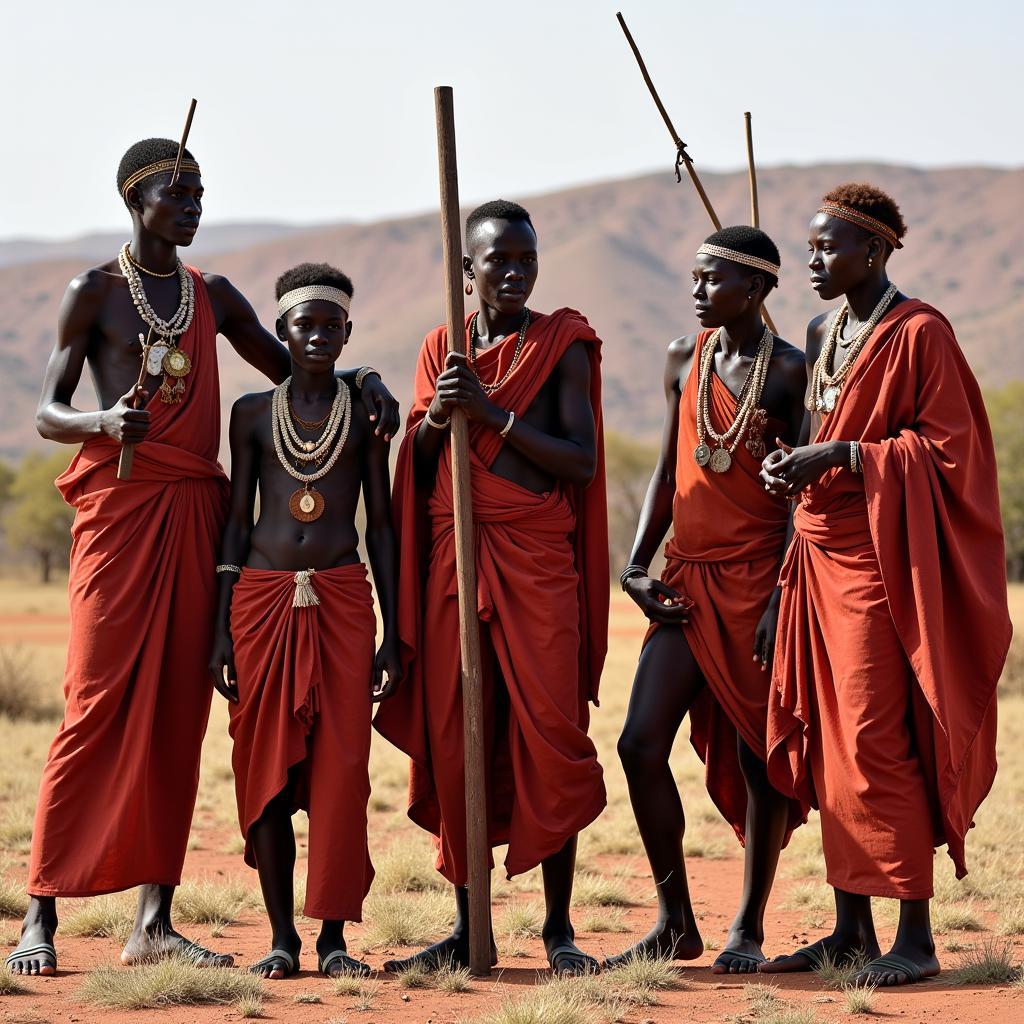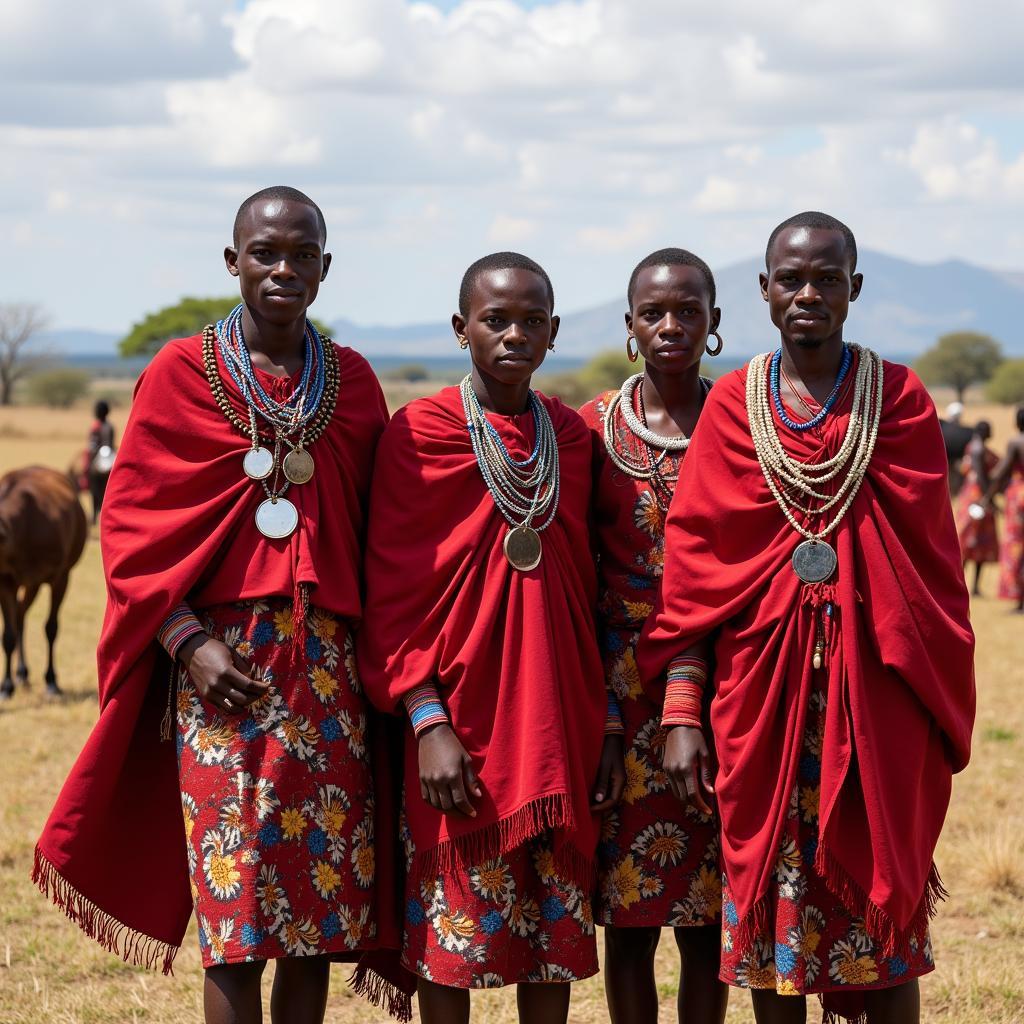Exploring Africa’s Aboriginal Tribes: A Journey into Rich Cultures
African Aboriginal Tribes represent a vibrant tapestry of ancient traditions, languages, and ways of life. From the nomadic pastoralists of the Sahara to the hunter-gatherer communities of the Kalahari, these diverse groups offer a fascinating glimpse into the human story. This article delves into the captivating world of African aboriginal tribes, exploring their unique customs, challenges, and contributions to the continent’s rich cultural heritage.
Unveiling the Diversity of African Aboriginal Tribes
Africa is home to a vast array of indigenous communities, each with its distinct identity and heritage. It’s important to understand the term “aboriginal” in the African context doesn’t always align with usage in other parts of the world like Australia. Here, it encompasses groups who have maintained ancestral connections to their lands and preserved their traditional ways of life, often in the face of significant challenges. These groups can be broadly categorized based on their livelihoods, languages, and social structures, revealing an incredible diversity within the continent. From the San people of Southern Africa, renowned for their ancient rock art and tracking skills, to the Berber tribes of North Africa with their unique language and nomadic traditions, each group contributes to the continent’s mosaic of cultures.
The rich oral traditions, spiritual beliefs, and intricate social structures of African aboriginal tribes often hold profound knowledge about the environment, sustainable living, and human connection. Understanding these diverse perspectives is essential for appreciating the true depth and breadth of African culture.
 San People in the Kalahari Desert
San People in the Kalahari Desert
African Aboriginal Tribes: Guardians of Ancient Knowledge
Many African aboriginal tribes are the keepers of invaluable traditional ecological knowledge, passed down through generations. Their intimate understanding of the local flora, fauna, and natural resources is essential for sustainable resource management and conservation efforts. This knowledge often encompasses sophisticated medicinal practices, agricultural techniques, and methods for adapting to challenging environments. For example, the Himba people of Namibia utilize specific plant-based remedies for various ailments, while the Maasai of East Africa have developed intricate systems for managing their livestock and navigating the savanna ecosystem.
“The wisdom held within these communities is a treasure trove of information that can inform modern conservation practices,” says Dr. Anika Nkosi, a prominent anthropologist specializing in indigenous African cultures.
Facing Modern Challenges: African Aboriginal Tribes in a Changing World
African aboriginal tribes are increasingly facing numerous challenges in the modern era, including land encroachment, climate change, and cultural assimilation. The pressure to conform to mainstream society can lead to the erosion of traditional languages, customs, and ways of life. Access to education and healthcare also remains a significant issue for many communities. Despite these hardships, many tribes are actively working to preserve their cultural heritage and advocate for their rights.
 Maasai Tribe in East Africa
Maasai Tribe in East Africa
Language and Culture: The Heart of African Aboriginal Identity
Language plays a vital role in preserving the cultural identity of African aboriginal tribes. Many tribes speak unique languages that are often unrelated to the dominant languages of their respective countries. These languages are not just a means of communication, but also repositories of cultural knowledge, history, and traditions. Maintaining these languages is crucial for passing on cultural heritage to future generations. However, many indigenous languages are facing extinction due to the increasing pressure to adopt dominant languages.
“Language is the soul of a culture,” notes Professor Kwame Asante, a renowned linguist specializing in African languages. “Protecting indigenous languages is essential for safeguarding the rich diversity of African cultures.”
The Future of African Aboriginal Tribes
The future of African aboriginal tribes depends on a multifaceted approach that recognizes and respects their rights, cultural heritage, and contributions to society. Supporting sustainable development initiatives, promoting cultural tourism, and empowering communities to manage their own resources are essential steps towards ensuring their continued well-being.
Preserving the cultural heritage of African aboriginal tribes is not just about protecting the past, but also about ensuring a vibrant and diverse future for Africa and the world. By understanding and appreciating the rich tapestry of African aboriginal cultures, we can learn valuable lessons about resilience, adaptation, and the importance of cultural diversity.
Conclusion
African aboriginal tribes represent a vital part of the continent’s heritage. Understanding and preserving their unique cultures, languages, and traditions is essential for celebrating Africa’s rich diversity and ensuring a sustainable future for all. By working together, we can support these communities in facing modern challenges and ensuring that their voices are heard.
FAQ
- What are some of the major challenges faced by African aboriginal tribes? (Land encroachment, climate change, and cultural assimilation are some key challenges.)
- How many different aboriginal tribes are estimated to exist in Africa? (There are hundreds of distinct indigenous groups across the continent, each with its own unique culture and language.)
- What role does language play in preserving aboriginal cultures? (Language is crucial for transmitting cultural knowledge, history, and traditions to future generations.)
- How can tourism benefit aboriginal communities? (Cultural tourism, when done responsibly, can provide economic opportunities and raise awareness about the importance of cultural preservation.)
- What are some examples of traditional ecological knowledge held by aboriginal tribes? (Examples include medicinal practices, sustainable agriculture, and resource management techniques.)
- How can I learn more about specific African aboriginal tribes? (Further research can be conducted online, in libraries, and through cultural centers.)
- What efforts are being made to protect the rights of aboriginal communities? (Various organizations and governments are working to secure land rights, promote cultural preservation, and improve access to essential services.)
Need Help?
For assistance or further information regarding African Aboriginal tribes, feel free to reach out to us. Contact us 24/7 at:
Phone: +255768904061
Email: [email protected]
Address: Mbarali DC Mawindi, Kangaga, Tanzania
We encourage you to explore other articles on our website to deepen your understanding of African culture and life.